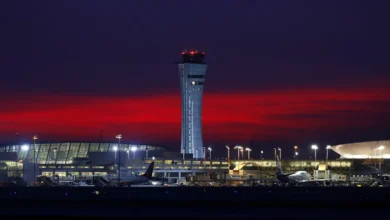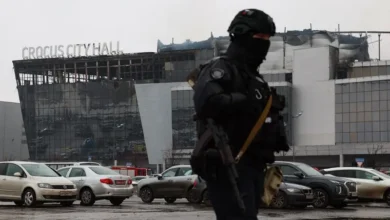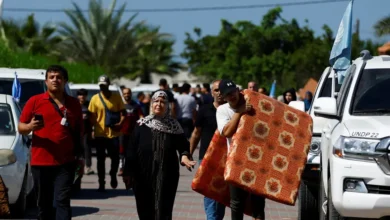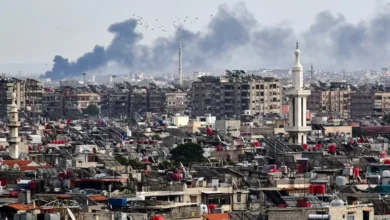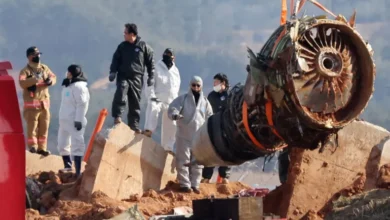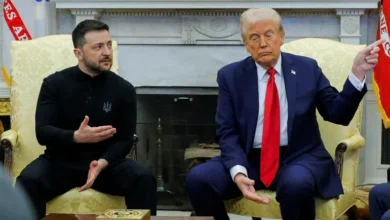Watching the watchdogs: Fear in newsrooms silences pro-Palestine voices
Rami G Khouri
Rami G Khouri
The Palestinian-Israeli conflict that now enters its second century is fought on two parallel battlefields. The first comprises the violence on the ground which has reached new heights in recent weeks. The second is the less visible but equally virulent battle in the media and the public information sphere in North America and Europe, where Israel and its surrogates have stepped up attempts to silence journalists who express pro-Palestine or balanced and historically contextualised views.
For years, right-wing pro-Israeli groups like the Committee for Accuracy in Middle East Reporting in America (CAMERA) and the Canary Mission have tried to silence academics, activists and journalists who offer Palestinian perspectives, so that Israeli views prevail. Some individuals who fear losing jobs or not being hired or promoted buckle under.
A sinister new tactic tries to silence journalists not because of their reporting, but over social media opinions they posted, sometimes years ago.
Since the start of the latest Israeli war on Gaza, a number of media professionals have been fired or suspended in such circumstances. Jackson Frank, a sports reporter in Philadelphia, was fired by PhillyVoice.com because of his tweets supporting the Palestinian cause.
Zahraa Al-Akhrass was dismissed by her employer, Canada’s Global News, due to her social media posts drawing attention to the suffering of the Palestinians. Kasem Raad was fired from his job at Welt TV, a subsidiary of German media company Axel Springer, for questioning internal pro-Israel policies.
Issam Adwan, an Associated Press Gaza reporter was suspended because of recent as well as past social media posts that criticised Israel as an apartheid regime. And at least six Arab journalists are facing an internal investigation at the BBC over their social media activity which allegedly shows their “anti-Israel bias”.
All this is happening amid reports that some Western media companies are instructing staff not to provide context for the Israeli war on Gaza or even to downplay Palestinian casualties.
When asked to explain this trend, seasoned academic analyst of North American-Middle East interactions and Georgetown University Professor Nader Hashemi told me the following: “For the West, both the media and politicians, this is primarily a story about Israel. The Palestinians are merely an appendage to this story. This is connected to the long history of Western anti-Semitism and the Nazi Holocaust. Within this framework, the humanity of Palestinians is at best a secondary consideration. Everything we have seen on CNN and from the White House, since October 7 confirms this truism.”
My own analysis from five decades of documenting and countering Israeli propaganda in the US is that its advocates are worried – because their old tactics no longer have the same impact on Western audiences. That is perhaps why accusations of anti-Semitism and of supporting terrorism are now so frequent; they worked well in the past, but seem less effective today when they are arbitrarily used to target people who are neither anti-Semitic nor terror lovers.
While there have been dismissals and suspensions of journalists, there also have been those who have received support from their media employers. Los Angeles Times Managing Editor Sara Yasin, for example, was accused of being pro-Hamas in some of her retweets that criticised Israel’s actions, but her management emphatically rejected the claims as false.
Pulitzer Prize-nominated opinion journalist Abdallah Fayyad, who recently completed three years on the Boston Globe editorial board, explains that there is as a prevalent “culture of fear in many newsrooms”. He told me that most editors are not experts on foreign policy or the Middle East, so their coverage tends to follow the pro-Israel US State Department and White House on the issues.
“Most journalists do not interrogate this issue like they do others they cover, like Black Lives Matter. So when they are hit with a flood of letters, social media criticisms, or threats to end subscriptions because of their more balanced coverage, they tend to take the easier route and continue the mainstream media’s pro-Israel slant.”
This culture of fear is also manifested in who media outlets choose to comment on the events in Israel-Palestine. In the past three weeks, a number of Palestinian American commentators have alleged that either they have been dropped from TV appearances or their pre-recorded commentary has not been aired. Among them are Noura Erakat of Rutgers University, Yousef Munayyer of the Arab Center-Washington, or political analyst Omar Baddar.
They believe they have been sidelined because they challenge US mainstream TV networks’ coverage that favours the Israeli and US government lines.
But there has also been a pushback against the pressure and intimidation campaigns targeting pro-Palestine voices. Arab Americans and progressive allies have mobilised to protect citizens’ constitutional rights, document incidents of pressure and harassment, and draw attention to them.
Palestine Legal, a US-based civil rights organisation that monitors anti-Palestinian incidents, notes in its latest report that people who openly show solidarity with Palestinians in Gaza face greater intimidation. It documents that heightened harassment of Palestine advocates has prompted over 260 “harassment and censorship attempts”. It concludes that pro-Palestine advocates face “a wave of McCarthyite backlash” that continually affects personal and professional lives.
The young but dynamic Arab and Middle Eastern Journalists Association said it was, “deeply troubled by reports that journalists of Middle Eastern and North African descent face bias at work and are being sidelined from reporting or commenting on the current war…(while) suggestions for nuance, balance, and using accurate and precise language in reporting are being ignored in newsrooms”.
When I asked them about the campaigns against individuals or companies that challenge unbalanced pro-Israeli narratives, they replied: “Targeting or isolating journalists for honest coverage that contrasts to a preferred view is censorship and must be opposed by anyone who values freedom of the press. Bombing or shooting journalists reporting from the ground, or their families, is a war crime that we unequivocally condemn.”
This media battlefield is worth watching closely, because, for the first time in a century, Zionist tactics to maintain a pro-Israel line in the US and elsewhere in the West are more effectively checked and countered by advocates of balanced reporting.
